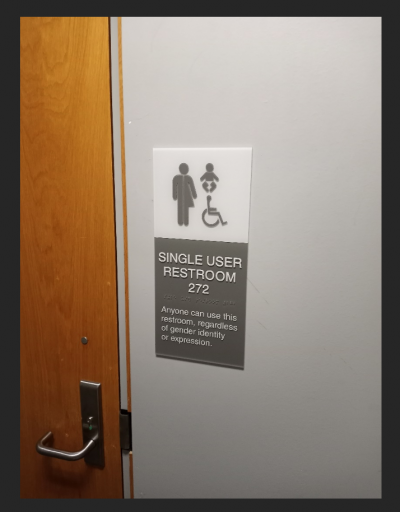
Posted September 27, 2021 by Veronica A. Stafford
"Maybe the most crucial question raised by this case is whether the ICRA provides additional protection above and beyond Title VII of the Civil Rights Act."
Iowa Supreme Court Hears Oral Arguments in Sex and Gender Discrimination Case
By: Veronica A. Stafford
September 27, 2021
Vroegh v. Iowa Department of Corrections, called “a historic Iowa case” by KCRG News,[1] and described as “a fight for fairness in the workplace” by the American Civil Liberties Union,[2] came up for oral argument at the Iowa Supreme Court last week.
Jessie Vroegh was employed by the Iowa Department of Corrections (IDOC) as a registered nurse from 2009 to 2016.[3] During that time, he was in the process of transitioning from female to male.[4] He legally changed his name, began dressing in male clothing, and referred to himself with male pronouns.[5] In 2014, as part of his transition, he requested permission to use the male bathroom and showers at work.[6] The warden informed Vroegh that he could use a gender-neutral bathroom with a locker while the IDOC wrote a bathroom use policy for all IDOC facilities.[7] A year and a half later, the warden let Vroegh know that the gender-neutral bathroom would be his permanent bathroom and that no facility-wide policy had been created.[8]
Vroegh brought a civil suit against the IDOC for violation of the Iowa Civil Rights Act (ICRA) for employment discrimination based on sex and gender identity.[9] In 2019, a Polk County jury awarded Vroegh $100,000 in damages for emotional distress caused by the discrimination.[10] Vroegh also raised a claim against Wellmark for wage discrimination due to denying coverage for a mastectomy on the state-sponsored insurance plan that Wellmark administered.[11] The trial judge dismissed Wellmark from the suit prior to trial.[12] The State appealed, and Vroegh brought a cross-appeal against Wellmark.[13]
The Iowa Supreme Court accepted the case on direct appeal and heard oral arguments on September 15, 2021.[14]In their oral arguments, the parties highlighted the agreement between Vroegh and the IDOC warden.[15] The State emphasized that it was improper for the trial court to instruct the jury on both gender identity and sex discrimination and argued that the IDOC warden believed that the agreement reached between herself and Vroegh sufficed for a non-discriminatory solution.[16] Vroegh argued that discrimination based on sex is necessarily discrimination on the ground of gender identity,[17] as the Supreme Court held in Bostock v. Clayton County.[18] Wellmark insisted that it did not have the authority to approve a procedure excluded from the state-sponsored insurance plan and that as gender dysphoria was listed as an exclusion in Vroegh’s plan, Wellmark was unable to provide coverage.[19]
Although the parties relied on federal and state law in their arguments, Iowa law controls here. Maybe the most crucial question raised by this case is whether the ICRA provides additional protection above and beyond Title VII of the Civil Rights Act. While Title VII protects against discrimination on the basis of race, color, religion, sex, or national origin[20], the ICRA includes sexual orientation and gender identity as protected classes.[21] In their briefs, Vroegh and the IDOC use “sex” and “gender identity” interchangeably.[22] This could be a strategic move to maximize the potential grounds for relief and make it harder to respond to one of the protected classes independently. It could also be because, for Vroegh, the two are so intertwined that discrimination on the basis of one necessarily means discrimination based on the other. Regardless, it will be interesting to see how the Iowa Supreme Court rules and if this case will be significant for transgender supporters or opponents.
[1] Ryan J. Foley, Jury Sides with Transgender Employee in 'Historic' Iowa Case, KCRG (Feb. 13, 2019).
[2] Vroegh v. Iowa Department of Corrections, AMERICAN CIVIL LIBERTIES UNION (Aug. 18, 2021).
[4] Id.
[6] Appellant’s Brief, supra note 3, at 11.
[7] Appellee’s Brief, supra note 5, at 33.
[8] Id.
[9] Appellee’s Brief, supra note 5, at 27–28. Included in this claim was the warden of the IDOC and the Iowa Department of Administrative Services. They responded to the claim together as the State.
[10] Appellant’s Brief, supra note 3, at 12. Vroegh was also awarded $20,000 for emotional distress caused by the denial of insurance coverage for a mastectomy. This was against the Iowa Department of Administrative Services.
[11] Id.
[12] Id.
[13] Id.
[15] Id.
[16] Id.
[17] Id.
[18] Bostock v. Clayton County, 140 S.Ct. 1731 (2020).
[19] Vroegh, supra note 14.
[20] Civil Rights Act of 1964, 42 U.S.C. § 2000e-5.
[21] IOWA CODE §216.6.
[22] See, e.g., Appellee’s Brief, supra note 5, at 26; see, e.g., Appellant’s Brief, supra note 3, at 46.